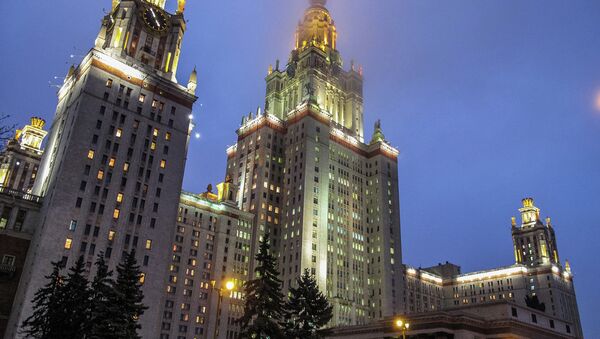MOSCOW, September 16 (RIA Novosti) – Lomonosov Moscow State University (MSU) improved its ranking by six compared with last year’s results, raising its position among the 200 best universities in the world, as noted according to university ranking publication ‘QS University Subject Rankings 2014,’ a university ranking publication. The number of Russian universities participating in the ranking has increased by three.
According to QS, MSU remains the only Russian university worthy of entering the top 200. This year it climbed six places to rank 114th, ranking higher than it did two years ago (the school had ranked 120th in 2013 and 116th in 2012).
Other Russian universities which improved their positions include St. Petersburg State University (which ranked 233rd, compared with 240th in 2013 and 253rd in 2012), Bauman Moscow State Technical University (which ranked 322nd, compared with 334th in 2013 and 352nd in 2012), and Novosibirsk State University (which ranked 328th, compared with 352nd in 2013 and 371st in 2012).
Appearing for the first time in the ranking is the National Research Nuclear University (Moscow Engineering Physics Institute), which ranked 490th, the Saratov National Research University, which ranked between 601 and -650, and the Moscow Institute of Steel and Alloys, which ranked over 700.
The ranking’s authors based the universities’ final score on six criteria, including academic reputation, employer reputation, faculty/student ratio, citations per faculty, international student ratio and international staff ratio.
The complete list included 863 institutions, including 21 Russian universities. The Moscow State Institute of International Relations dropped 13 and took 399th place (367th in 2012). St. Petersburg State Polytechnical University slipped into 481-490th place (having placed in the 451-460 group in 2013). Ural Federal University also dropped from the 501-550 group to the 551-600 group.
Improving their positions were the Moscow Physical-Technical Institute (moving from the 441-450 group to the 411-420 group), the Kazan (Volga region) Federal University (from 601-650 to 551-600), Tomsk State University (from 551-600 to 491-500), Tomsk Polytechnic University (from 551-600 to 501-550), and Peoples’ Friendship University of Russia (from 491-500 to 471-480).
The National Research University – Higher School of Economics remains in the 501-550 group. The Southern Federal University also maintained its previous position (601-650). The Lobachevsky Nizhny Novgorod State University, the Plekhanov Russian University of Economics, Far Eastern Federal University, and Voronezh State University remained in the 701+ group.
According to the rating’s creators, all of the Russian universities managed to improve their performance in terms of academic reputation. The 11 leading Russian universities were able to maintain their positions in the employer reputation ranking. Novosibirsk State University was the only Russian school which was able to improve its citation index ranking.
The head of research at QS, Ben Souter, has noted that the achievements of Russian institutions reflect the efforts that have been made toward the internationalization of higher education and their move to adopt international standards. In his words, “it is necessary to take further efforts, if Russian universities want to rank even higher among the top global rankings.”
An agreement between the British company and the information agency Rossiya Segodnya has resulted in the creation of a Russian-language edition of the tenth version of the QS ranking.
QS - Quacquarelli Symonds is a leading global provider of analytical information on higher education and employment search services. The service’s activity extends to 50 countries; it works with more than two thousand leading universities and twelve thousand employers. The company assesses and ranks about three thousand universities annually. To enter the QS ranking, a university must offer all levels of education, from Bachelor’s degrees to doctorates. Also, the school must cover at least two out of five areas of knowledge (the humanities and the arts, engineering and technical sciences, natural sciences, medicine and life sciences, social sciences and management). In 2013 the company ranked and listed 800 universities from 76 countries. In conducting research for the ranking, over 62,000 representatives of the academic community and over 27,000 employers were interviewed.




